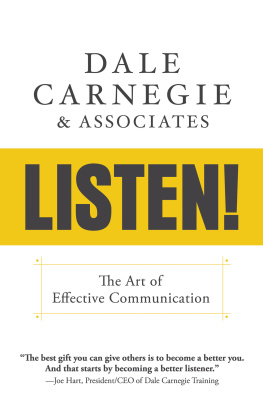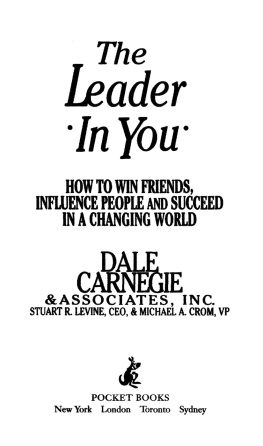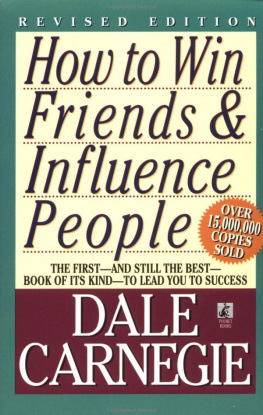Guide to
Dale Carnegies
How to Win Friends and Influence People
by

Instaread
Please Note
This is a companion to the original book.
Copyright 2016 by Instaread. All rights reserved worldwide. No part of this publication may be reproduced or transmitted in any form without the prior written consent of the publisher.
Limit of Liability/Disclaimer of Warranty: The publisher and author make no representations or warranties with respect to the accuracy or completeness of these contents and disclaim all warranties such as warranties of fitness for a particular purpose. The author or publisher is not liable for any damages whatsoever. The fact that an individual or organization is referred to in this document as a citation or source of information does not imply that the author or publisher endorses the information that the individual or organization provided. This concise companion is unofficial and is not authorized, approved, licensed, or endorsed by the original books author or publisher.
Table of Contents
Overview
How to Win Friends and Influence People by Dale Carnegie is a classic self-help book. It instructs readers on ways to improve their standing with others and convince others to do things using strategic courtesy, conversational techniques, and proven methods of motivation.
There are three fundamental techniques to improve your ability to manage others. The first is to avoid any kind of criticism, complaint, or other type of negative tactic. Negativity only puts people on the defensive. The second technique is to frequently give earnest appreciation and praise. The third is to find a way to encourage others to want what you want. These fundamental techniques apply to the various principles for encouraging agreement and leading effectively.
The best ways to be liked are to become interested in others first, smile, and refer to others by name. People who are good at winning friends are good listeners and learn to talk about other peoples interests. They can make others feel important.
People who win friends and influence avoid arguments at all costs, do not point out when others are wrong to their faces, and admit when they are wrong. They begin interactions with positivity and encourage others to agree with them from the start. People with influence actually let others talk more in conversations. They also try to make their ideas seem like the ideas of the people with whom they are speaking.
Empathy and sympathy are vital in social interactions, so anyone seeking friends and influence should consider other peoples perspectives and sympathize with their ideas and desires. When straightforward conversation is not enough to motivate another person, additional techniques include mentioning the noble motives behind the request, dramatizing an argument with demonstrations, or making a competition out of it.
Leaders in particular should be quick to praise and appreciate even the slightest improvements. When they need to discuss someone elses mistake, they should address it indirectly and give that person a way to keep his or her dignity. They also should admit their own mistakes and imperfections before offering criticism. They should describe faults as easy to correct. Instead of giving direct orders, leaders should phrase their requests as questions. They should also encourage others to live up to reputations that might not have been earned yet. Developing these skills can result in career advancement and better parenting.
This is the revised 1981 edition of Carnegies classic text.
Important People
Dale Carnegie (1888-1955) was the author of several self-help books and was a popular lecturer on the subjects of social skills and public speaking.
Lowell Thomas (1892-1981) wrote dozens of books about his travels across the world and was a newscaster for CBS Radio. Carnegie was his personal manager, and Thomas wrote a biography of Carnegie for inclusion in How to Win Friends and Influence People.
Dorothy Carnegie was the wife of Dale Carnegie. She wrote the preface to this edition of How to Win Friends and Influence People.
Charles Schwab (1862-1939) led Bethlehem Steel, the second largest steel producer in the United States in its time.
Abraham Lincoln (1809-1865) was the 16th president of the United States. His administration saw the United States through the largest portion of the Civil War.
Al Capone (1899-1947) was a gang boss in Chicago during the era of alcohol prohibition.
Ralph Waldo Emerson (1803-1882) was a transcendentalist writer and poet best known for his essays on the natural world and civil society.
William James (1842-1910) was a philosopher and writer who is considered a founder of modern psychology.
Theodore Roosevelt (1858-1919) was the 26th president of the United States.
William Shakespeare (1564-1616) was a noted poet and playwright of the English language.
William Taft (1857-1930) was the 27th president of the United States.
Woodrow Wilson (1856-1924) was the 28th president of the United States and held office during World War I.
Key Insights
- Social skills and public speaking, vital skills in business and personal life, are in high demand.
- In order to make friends and acquire influence, do not criticize others. Call attention to mistakes indirectly and make problems seem easy to correct.
- Earnest appreciation makes others agreeable, so begin with praise and comment on every slight improvement with positivity.
- People with good social skills can make others want what they want. The best way to get others to do things is by giving them a reason to be happy about doing them.
- Others will like you more if you become genuinely interested in them, talk about their interests, and make them feel important. Listen well, let others do the talking, and commit their names to memory.
- Conversations rely on positive first impressions, and the best outcomes arise from conversations that start with friendliness, a smile, and points of agreement.
- Socially skilled people avoid arguments because they cannot be won gracefully. Influential people show respect for others opinions, try to see the issue from others perspectives, exercise sympathy, and admit when they are wrong.
- Making others want to do things can involve letting those people think the idea was theirs. This can be accomplished by asking questions instead of giving direct orders.
- People can also be motivated through challenges, appeals to noble concepts, or dramatic demonstrations of ideas. They will often try to uphold a good reputation if one is given to them.
Analysis
Key Insight 1
Social skills and public speaking, vital skills in business and personal life, are in high demand.
Analysis
When Dale Carnegie started teaching courses on social skills and public speaking, he was surprised by the demand for such instruction. Surveys revealed that people want to learn these skills which often result in career advancement and better relations at home.
These skills are still in high demand. Toastmasters International, a club whose membership attends regular meetings to improve public speaking through practice, has more than 332,000 members in 135 countries with an average of 21 members per club. Members receive opportunities to practice speaking in front of other members and coaching on how to improve public speaking skills. [1] Public speaking and social skills are naturally better improved in person because the internet cannot realistically create the same environment a person will experience when giving a presentation at work. Even if the internet market develops its own solution to the need for public speaking training, which is not effectively taught in some public schools, it cannot substitute for a face-to-face encounter that a public speaking club can provide. [2]
Next page
















